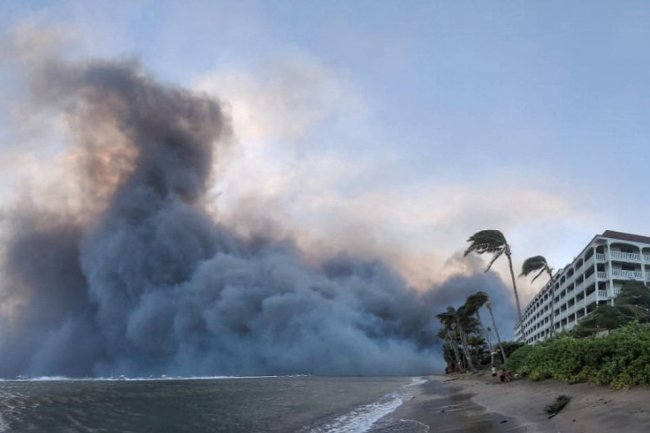Another Biden Speech in Need of Clarification
Limiting fuel for nuclear plants will not reduce emissions of greenhouse gas. By James Freeman Aug. 8, 2023 7:16 pm ET President Joe Biden appears Tuesday at Red Butte Airfield, south of Tusayan, Arizona. Photo: jim watson/Agence France-Presse/Getty Images President Joe Biden has been known to get into trouble when he strays from his scripted remarks, but this doesn’t explain the confusion embedded in his Tuesday address in Arizona. Chris Megerian and Terry Tang report for the Associated Press from Grand Canyon National Park: Declaring it good “not only for Arizona but for the planet,” President Joe Biden on Tuesday signed a national monument designation for the greater Grand Canyon, turning the decades-long visions of Native American trib


President Joe Biden appears Tuesday at Red Butte Airfield, south of Tusayan, Arizona.
Photo: jim watson/Agence France-Presse/Getty Images
President Joe Biden has been known to get into trouble when he strays from his scripted remarks, but this doesn’t explain the confusion embedded in his Tuesday address in Arizona.
Chris Megerian and Terry Tang report for the Associated Press from Grand Canyon National Park:
Declaring it good “not only for Arizona but for the planet,” President Joe Biden on Tuesday signed a national monument designation for the greater Grand Canyon, turning the decades-long visions of Native American tribes and environmentalists into reality...
“Preserving these lands is good, not only for Arizona but for the planet,” said Biden, who spoke with a mountain vista behind him using a handheld mic to counter the wind and wearing a baseball cap and sunglasses to shield him from the sunshine...
The president tied the designation to his administration’s larger push to combat climate change and noted this summer’s extreme heat, which has been especially punishing in places like Phoenix. He said extreme heat was responsible for more deaths than other natural disasters like floods and hurricanes but added, “None of this need be inevitable.”
No, it doesn’t. And shielding oneself from the Arizona summer sunshine seems sensible enough. The confusion lies in the fact that the president is locking up nearly a million acres and the principal result is to limit potential uranium mining in the region. Uranium fuels nuclear power, a rare technology that can efficiently generate lots of energy while generating zero greenhouse-gas emissions. With this designation he’s just made it harder to meet his climate goals but seems to be under the impression that he’s done the opposite.
One might assume that the president decided to repeat his climate talking points at the wrong moment, or perhaps that a summer intern loaded the wrong speech into the teleprompter. But this seems to have been the White House plan all along—and this time Mr. Biden’s subordinates appear to be just as confused as he is.
On the Monday flight out to Arizona aboard Air Force One, White House press secretary Karine Jean-Pierre went with the same approach of presenting the administration’s new obstacle to zero-emission energy as some sort of climate initiative.
“President Biden continues to make combating the climate crisis a core tenet of his presidency,” said Ms.Jean-Pierre, who then introduced reporters to assistant to the president and national climate adviser Ali Zaidi. Ms. Jean-Pierrer said that Mr. Zaidi was “here to share more about the President’s climate agenda and the trip that we’re heading to.”
Here’s what he said, according to the White House transcript:
Great. As Karine said, the President has been focused on mounting an all-of-government response to the climate crisis. We see the impacts in our communities every single day. And the West, in particular, has been feeling the brunt of this, with heat waves blanketing communities, the skies turning orange.
But embedded in this crisis is also an opportunity for us to bring the country together, to advance our conservation agenda, and to spark a manufacturing renaissance here in the country. The President’s trip will demonstrate how he’s doing that.
Tomorrow, he will be announcing his fifth new national monument. It’s nearly 1 million acres. And folks know about the 300-million-year-old cliffs that line the Grand Canyon. What’s less known is the 300 cultural sites that make up this area. They tell a rich and important history. And it’s the reason why 12 tribes stepped up to request that this monument be declared. The President is going to take action to do just that.
What would we do without climate advisers who are also ready to share their expertise on rich cultural history? One can’t help but be reminded of the public health experts who momentarily abandoned their opposition to unmasked gatherings during the Covid panic in order to endorse leftist political protest.
Perhaps voters will be reassured that the alleged climate crisis can’t be that bad if even the president’s climate adviser recognizes other priorities. A reasonable conclusion is that “an all-of-government response” is hardly necessary if even the White House climate office doesn’t want to go overboard in the pursuit of emissions reductions.
But apparently the loss of potential uranium mining isn’t the only problem with the president’s action. In the Salt Lake Tribune Mark Eddington reports:
Chris Heaton, a Kanab City Council member and sixth-generation rancher who grazes his 200 head of cattle on roughly 48,000 acres he owns or leases on the Arizona Strip, is especially worried. He said the monument includes 1,000 acres of his private property...
“Ranchers have been using this land since we came here, and we have done a pretty dang good job of it,” Heaton said. “That’s why the [federal government] wants it, because they think they manage it better than we can.”
Heaton also called the notion that the national monument would protect indigenous people’s culture and sacred sites a smokescreen because the government will lure thousands of people to the region through advertising, which will result in the land being desecrated with graffiti and human waste.
***
Perhaps the White House climate office should take time off from its intensive study of cultural treasures to notice that outside of nuclear power, the zero-emission energy movement isn’t exactly thriving. The Journal’s Mari Novik and Jennifer Hiller report:
The wind business, viewed by governments as key to meeting climate targets and boosting electricity supplies, is facing a dangerous market squall.
After months of warnings about rising prices and logistical hiccups, developers and would-be buyers of wind power are scrapping contracts, putting off projects and postponing investment decisions. The setbacks are piling up for both onshore and offshore projects, but the latter’s problems are more acute.
In recent weeks, at least 10 offshore projects totaling around $33 billion in planned spending have been delayed or otherwise hit the doldrums across the U.S. and Europe.
***
James Freeman is the co-author of “The Cost: Trump, China and American Revival” and also the co-author of “Borrowed Time: Two Centuries of Booms, Busts and Bailouts at Citi.”
***
Follow James Freeman on Twitter.
Subscribe to the Best of the Web email.
To suggest items, please email [email protected].
(Teresa Vozzo helps compile Best of the Web.)
***
What's Your Reaction?

















